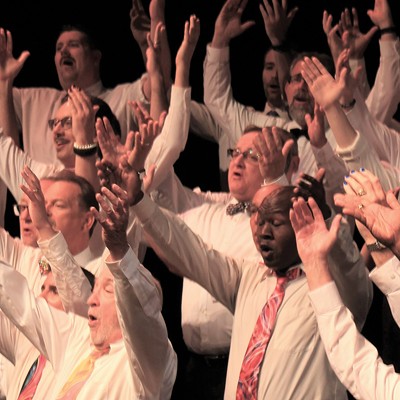Sins of the Mother is a Lifetime television movie starring Jill Scott; when it premiered in 2010, the film became the second-highest-rated original movie in the network's history.
Oh, wait, I'm sorry. This is actually a review of a different Sins of the Mother, a 2009 drama by playwright Israel Horovitz, currently being performed by Beowulf Alley Theatre Company in a production directed by Vince Flynn.
I bring up the identical titles, because Sins of the Mother is a much more appropriate name for a Lifetime television movie or a Danielle Steel novel (and for the record, a Steel novel called The Sins of the Mother is due out later this year), than for the spare, gritty affair that is this Horovitz play and Beowulf production.
For instance, the set for the first act is simply a bunch of folding chairs where four unemployed male dockworkers gather, waiting to get their unemployment cards signed. This is not something you'd see in either a Lifetime movie or a Steel novel.
Like many of Horovitz's plays, Sins is set in Gloucester, Mass. This seaside town has been the playwright's inspiration for more than 30 years, and the focus of Sins is the town's working-class men, who are suffering the effects of a declining fishing industry.
Douggie Shimmatarro (Anthony Saccocio) has drifted back into town in search of work after moving away to live with a grandmother when he was just a child. Waiting around at the fish-packing plant, he meets Bobby Maloney (Hal Melfi), an older gentleman who has spent his life in Gloucester.
Now resigned to living on unemployment, Bobby recalls the bad old days when the fishing industry began to fold. Men purposely sank their boats for the insurance money, and some turned to selling drugs.
It turns out that Bobby knew Douggie's mother, and secrets from her past start to come out. Two other unemployed workers, Dubbah (Jim Ambrosek) and Frankie (Ken Beider), also have connections to Douggie's mother and to the tragic events of long ago.
Sins of the Mother started out as a one-act play, and this becomes clear as you watch it. After a slow start, the action begins to rush ahead at the half-hour mark. The truth tumbles out, and the first act ends in violence that doesn't feel quite yet earned.
Still, it's entertaining to watch the four men interact. Horovitz has a sharp ear for a certain kind of fast-paced, working-class banter. None of the actors really nails the Boston-area accent (the characters all pepper their speech with New England expressions like "wicked smaht," and each actor has a different take on what that's supposed to sound like), but they've got an easy rhythm between them that's engaging to watch.
The second act picks up and feels quite different in purpose and tone. There's more dark comedy, and we're introduced to a new major character: Philly, Frankie's identical twin brother. Philly has left Gloucester and founded a successful business. It's unclear why he's returned or how much he knows about past events.
Beider also handles the role of Philly, and it's a treat to watch him create a new character halfway through the evening. An eccentric businessman, Philly wears his hair slicked back and insists on keeping his sunglasses on when inside. ("Light-sensitive," he claims.) Costumer David Swisher puts him in a suit with a few garish touches: a yellow shirt and purple socks. The outfit works, reflecting Philly's odd mixture of savvy, sensitivity and cruelty. Philly hates his father, yet takes advice from Oprah on forgiveness; he's manipulative, with deep-running loyalties and hatreds.
It's unclear what he wants, but it's very clear that he wants something, and this makes him quietly terrifying. Beider wisely plays him with restraint, often remaining seated while the other characters flutter around him.
Beider is so great as Philly, in fact, that his performance unintentionally points out the weaknesses of the other three actors. Next to the subtle power and depth of feeling that Beider gives Philly, Melfi is a bit wooden as Bobby, and Saccocio's Douggie is a little flat.
Ambrosek as Dubbah has the least to do. He manages, however, to pull off a difficult task for an actor, which is to listen and react. During Philly's long monologue, Ambrosek's reactions add a painful realism to the scene.
The play ends with a short third act, which is basically a coda to Act 2. It's unnecessary, merely underscoring the themes of familial revenge and corruption of community that have already been examined. (For example, just to make absolutely sure we see the connections between this play and Greek tragedies, Horovitz has Philly quote Oedipus Rex.)
Still, the production's last image—Beider's Philly extending his hands to the audience in an ambiguous gesture that could mean forgiveness, triumph or supplication—is creepy and memorable.
Sins of the Mother has a terrible title, and it's a good if not great play. It feels like two one-act plays that happen to be about the same characters, with a coda slapped on to wrap things up.
But Beider's performance is a great match between actor and script, bringing out the dark humor and pathos of the play. For nurturing this performance, director Flynn and Beowulf Alley deserve praise.









